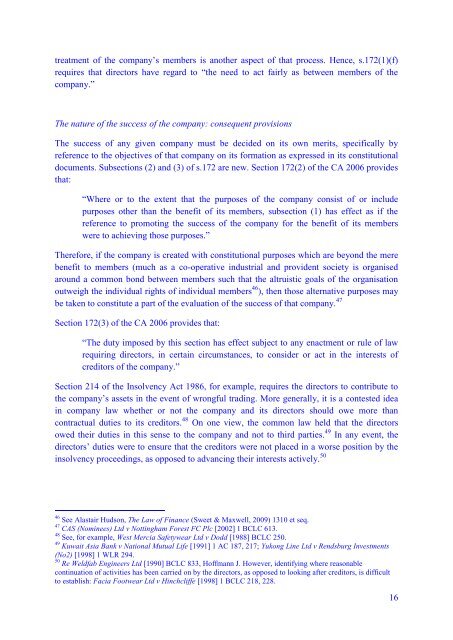Chapter 7 Directors' Duties - alastairhudson.com
Chapter 7 Directors' Duties - alastairhudson.com
Chapter 7 Directors' Duties - alastairhudson.com
You also want an ePaper? Increase the reach of your titles
YUMPU automatically turns print PDFs into web optimized ePapers that Google loves.
treatment of the <strong>com</strong>pany‟s members is another aspect of that process. Hence, s.172(1)(f)<br />
requires that directors have regard to “the need to act fairly as between members of the<br />
<strong>com</strong>pany.”<br />
The nature of the success of the <strong>com</strong>pany: consequent provisions<br />
The success of any given <strong>com</strong>pany must be decided on its own merits, specifically by<br />
reference to the objectives of that <strong>com</strong>pany on its formation as expressed in its constitutional<br />
documents. Subsections (2) and (3) of s.172 are new. Section 172(2) of the CA 2006 provides<br />
that:<br />
“Where or to the extent that the purposes of the <strong>com</strong>pany consist of or include<br />
purposes other than the benefit of its members, subsection (1) has effect as if the<br />
reference to promoting the success of the <strong>com</strong>pany for the benefit of its members<br />
were to achieving those purposes.”<br />
Therefore, if the <strong>com</strong>pany is created with constitutional purposes which are beyond the mere<br />
benefit to members (much as a co-operative industrial and provident society is organised<br />
around a <strong>com</strong>mon bond between members such that the altruistic goals of the organisation<br />
outweigh the individual rights of individual members 46 ), then those alternative purposes may<br />
be taken to constitute a part of the evaluation of the success of that <strong>com</strong>pany. 47<br />
Section 172(3) of the CA 2006 provides that:<br />
“The duty imposed by this section has effect subject to any enactment or rule of law<br />
requiring directors, in certain circumstances, to consider or act in the interests of<br />
creditors of the <strong>com</strong>pany.”<br />
Section 214 of the Insolvency Act 1986, for example, requires the directors to contribute to<br />
the <strong>com</strong>pany‟s assets in the event of wrongful trading. More generally, it is a contested idea<br />
in <strong>com</strong>pany law whether or not the <strong>com</strong>pany and its directors should owe more than<br />
contractual duties to its creditors. 48 On one view, the <strong>com</strong>mon law held that the directors<br />
owed their duties in this sense to the <strong>com</strong>pany and not to third parties. 49 In any event, the<br />
directors‟ duties were to ensure that the creditors were not placed in a worse position by the<br />
insolvency proceedings, as opposed to advancing their interests actively. 50<br />
46<br />
See Alastair Hudson, The Law of Finance (Sweet & Maxwell, 2009) 1310 et seq.<br />
47<br />
CAS (Nominees) Ltd v Nottingham Forest FC Plc [2002] 1 BCLC 613.<br />
48<br />
See, for example, West Mercia Safetywear Ltd v Dodd [1988] BCLC 250.<br />
49<br />
Kuwait Asia Bank v National Mutual Life [1991] 1 AC 187, 217; Yukong Line Ltd v Rendsburg Investments<br />
(No2) [1998] 1 WLR 294.<br />
50<br />
Re Weldfab Engineers Ltd [1990] BCLC 833, Hoffmann J. However, identifying where reasonable<br />
continuation of activities has been carried on by the directors, as opposed to looking after creditors, is difficult<br />
to establish: Facia Footwear Ltd v Hinchcliffe [1998] 1 BCLC 218, 228.<br />
16













